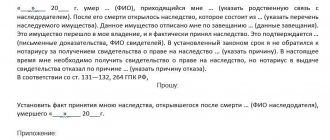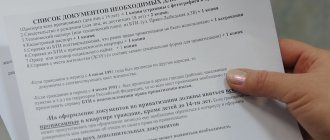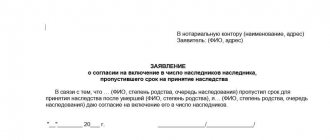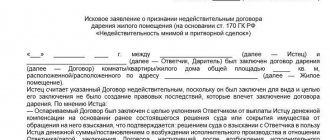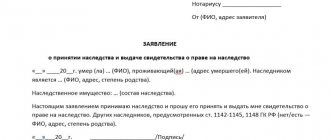Is it possible to cancel or change a will?
Russian legislation enshrines the principle of freedom of will - Art. 1119 of the Civil Code of the Russian Federation.
It is realized not only through the right of the testator to dispose of property at his own discretion by drawing up a declaration of will. Another manifestation of the principle of freedom is the right of a citizen to cancel or change a previously drawn up document.
Cancellation or change of will occurs in accordance with Art. 1130 Civil Code of the Russian Federation. To exercise such a right, the testator does not require the consent of any of his relatives, heirs or third parties. The property owner also does not have to explain the reasons that prompted him to change or cancel his decision.
The legislation does not limit the testator in the number of statements of will drawn up - Art. 1119 of the Civil Code of the Russian Federation. After his death, the notary will be guided by the latest version of the document. In this case, previous wills will remain in force to the extent that they do not contradict the newly drawn one.
The procedure for changing the name of the applicant in a bank order
You can draw up a bank order for free at a branch of a financial institution.
You can change or cancel a document as follows:
- Contact the credit institution again and change the order.
- Settle one's affairs. If the notarial expression of will for the deposit was executed after a testamentary disposition, then the inheritance occurs on the basis of the last will of the deceased.
- Draw up a will that includes information about the cancellation of the order.
For what reasons is a document cancelled?
The initiators of the annulment of the will may be:
- Testator.
- Heirs or other citizens who have the right to an obligatory share - only after the death of the owner.
Possible reasons for the testator to cancel his orders regarding property may be:
- Death of one of the candidates.
- Breaking relations with a successor means a quarrel, irreconcilable differences.
- Change of shares or composition of property.
The heirs can annul the will of the deceased only in cases where the norms of the law were violated during its preparation or approval. For example, the testator was incapacitated at the time of signing the document. Or the rights of obligatory heirs were not taken into account.
The testator has the right to deprive one or more heirs of property by:
- There is a special instruction about this in the will. For example, “I am disinheriting my son I.V. Petrov.”
- Distribution of property in such a way that the successor gets nothing.
See also:
How to disinherit an heir by law - step-by-step instructions
Who has the right to an obligatory share in the inheritance regardless of the will in 2021
Restoration of the will by the heirs
Presumptive heirs will have to deal with inheritance issues immediately after the death of the testator. If a will is lost after his death, they need to start searching for it as soon as possible, because... This document must be presented when claiming inheritance rights. The law allows a period of 6 months for this.
To find a document, the heirs must:
- first, search for the will among the documents kept in the testator’s house;
- then turn for help to the notary who, according to their assumption, drew up the will, presenting him with your passport, the death certificate of the testator, documents confirming the relationship with him (if the applicants for the inheritance are relatives);
- when the notary has no information about the will, you should look for it in the Unified Information System of the Notary (Unified Information System of the Notary). An electronic system for recording notarial acts was launched in 2014. Therefore, information is available only for those wills that were drawn up starting from this period.
How to cancel a document during the life of the testator
You can cancel an inheritance document during your lifetime in one of the following ways:
- By making a new will.
- Having issued an order to cancel the previous document.
Below is a detailed algorithm for the testator’s actions to implement each of the options.
Step 1
Compose the text of the document
How to make a new will
The declaration of will must be drawn up taking into account the mandatory requirements for the form and procedure for certification - Art. 1118 Civil Code of the Russian Federation, art. 1124 Civil Code of the Russian Federation. In case of failure to comply with such requirements, the will may be declared invalid - clause 1 of Art. 1124 Civil Code of the Russian Federation.
When composing a new document, you can cancel a previously compiled one by:
- Direct cancellation.
- Indirect cancellation.
In the first case, the owner of the property can indicate in the text that with the new will:
- Cancels what was previously compiled.
- Cancels certain provisions of the previous expression of will.
In the second case you can:
- Include in the document completely different orders regarding the distribution of the inheritance without a direct indication of cancellation - then the conclusion about the complete cancellation of the previous expression of will can be reached as a result of comparing the contents of the documents.
- Include other instructions only regarding the distribution of a certain part of the inheritance. The previous will is considered canceled in the part in which it contradicts the newly drawn one - clause 2 of Art. 1130 Civil Code of the Russian Federation.
In the latter situation, both documents remain in force, but the earlier one will be applied only to the extent that does not contradict the newly drawn one.
A new expression of will can also simply complement the previous one. Then the previous orders regarding the property will continue to be in full force. The exception is those provisions that differ from the newly drawn up document.
Sample will
Sample will (DOC, 16 KV)
See also:
How to make a will in 2021 - a detailed guide with step-by-step instructions
How to draw up an order to cancel a document
The order applies only to cases where the last will of the property owner has been revoked. It is drawn up in the same form as a will. Accordingly, the procedure for registration and certification will be identical.
The text of the order must reflect:
- Name - order to revoke a will.
- Place and date of its compilation.
- A will that is revoked.
- Certifying inscription of a notary.
Sample order to cancel a will
Sample order to cancel a will (DOC, 16 KV)
Who can help compose the text of the document?
To obtain advice on canceling or amending a will, you can contact an experienced lawyer.
The testator has the right to independently draw up a new declaration of will or order for cancellation. It is necessary to take into account that failure to comply with the form and procedure for certifying the document entails the risk of it being challenged by the heirs. And as a result, the will of the testator is recognized as invalid.
When canceling a previous will in whole or in part, as well as when drawing up an order to cancel the expression of will, the accuracy of the wording and completeness of the information provided about the property and who it will go to is important. In the absence of such data, the implementation of the true will of the testator will become impossible.
For example, in the new declaration of will, the owner forgot to indicate that the apartment he owns will be inherited not by his son, as in the previous document, but by his grandson. Therefore, his new wish will not be fulfilled.
A citizen can draw up a text from a notary by paying the state fee and the cost of his legal and technical services.
The best option is to use the services of a lawyer.
Lawyer Sergey Ershov will provide advice on the day of application, assist in changing the will, drawing up the text of a new declaration of will or an order to cancel a previously drawn up document, and suggest what wording to use to correctly reflect the will of the testator.
On the page you can familiarize yourself with the work schedule, find out the office address and contact numbers.
Step 2
Prepare the necessary documents. These include:
- Identification.
- Documents for property - their presence is not mandatory, but for reliability you can provide them.
- Evidence of the testator’s full legal capacity will help protect the citizen from having his will declared invalid due to the testator’s incapacity. But the notary will still check your legal capacity even without such documents.
- Previous Will - If the testator wishes to consult with a notary about what language is best to use to properly reflect the new will.
My article How to draw up a will in 2021 - a detailed guide with step-by-step instructions contains a detailed list of information that a notary needs to certify the will of the testator and is relevant for changing/cancelling the last will.
Step 3
Pay the state fee and notarize the expression of will.
What is the state duty?
There is no fee for issuing a cancellation order. But based on the application of the rules for certifying a will, the state duty will be 100 rubles. (as well as certification of a new document) - Art. 333.24 Tax Code of the Russian Federation.
In addition to the state fee, the testator must pay the cost of notary services of a legal and technical nature (drafting the text of the document, printing, copying, etc.). On average you will have to pay from 500 to 2 thousand rubles.
Their size is established annually by the Federal Notary Chamber for each region. You can get acquainted with the types of services and tariffs for the subject of the Russian Federation you are interested in on the FNP website.
What actions does a notary take when certifying a document?
The certification of the will or the order for revocation occurs according to the rules provided for the certification of a will. Notary:
- Verifies the legal capacity of the testator.
- Checks the compliance of the text of the document with the true will of the citizen.
- Involve witnesses when their participation is necessary. For example, when certifying a closed will or at the request of the property owner.
After completing the procedure, the notary gives one copy of the document to the testator, and keeps the other for himself.
Which notary should I contact to change/cancel my last will?
Notarization of a citizen's expression of will is a prerequisite for its legality. To do this, you must contact a notary, with the exception of cases of execution of a will in accordance with Art. 1127 of the Civil Code of the Russian Federation.
The owner of property is often concerned about the question of whether it is possible to revoke a will with another notary. The legislation does not oblige a citizen to contact exactly the notary who certified the original document - Art. 40 Fundamentals of the legislation of the Russian Federation on notaries.
If another notary was brought in to draw up a new expression of will or an order to cancel, it is advisable for the testator to inform the person who certified the citizen’s will earlier about this by:
- Sending a notification about the cancellation or change of the last will - indicating the data of the involved notary or the person entrusted by law with performing his function.
- Sending a copy of the newly drawn up document or cancellation order.
Important! Notification of the notary, who previously certified the testator's will, about the newly drawn up document is a kind of guarantee that the inheritance will be carried out in accordance with the new will of the citizen.
If a will is canceled or changed by the same notary, a mark to this effect is placed on the copy of the will kept by him. The specified information is also entered into the register of registration of notarial acts - Art. 58 Basics about notaries.
Form requirements
Every citizen can dispose of his property or funds in the event of possible death; for this it is necessary to draw up a will. The requirements for the content and form of the testamentary form are regulated by the Civil Code of the Russian Federation:
- a will can only be drawn up in the form of a written document written in the citizen’s own hand (in some cases it is allowed to draw up a document from the words of the testator, these circumstances are also specified in the Civil Code of the Russian Federation);
- a will will be declared invalid if it is not certified by a notary office (the certification mark is placed on both copies of the document, or on the envelope with the closed will);
- the contents of the will are protected secret; the procedure for disposing of the property can become known only after the death of the testator.
Having stated his will in writing and certified the document by a notary, the citizen receives one copy of the will. The second copy remains in the notary's office, and information about the certification record is entered into the federal notary register.
The contents of the testamentary form can include the conditions for the distribution of any type of property - movable things and objects, vehicles, real estate (land plots, apartments, private houses, etc.). The law also allows for the indication in the will of property that will be acquired after the document is drawn up.
Freedom of expression when drawing up a testamentary form implies the following conditions:
- the owner has the right to determine which of the citizens or legal entities will receive certain types of property assets, including an apartment;
- heirs may include relatives or strangers, and the law also allows legal entities to be indicated in the will (an enterprise will be able to receive inherited property if it exists at the time of the testator’s death);
- heirs of the first priority who are not listed among the recipients of property will be able to claim the obligatory share.
Any violation of the freedom and secrecy of the will will entail its invalidity. Such facts can be established during the life of the testator, or after the opening of inheritance proceedings.
How to change a will
This cannot be done by simply making changes to a previously certified document. Only a newly drawn up declaration of will, which will reflect the citizen’s changed instructions regarding the distribution of his property, can change the provisions of the previous one.
The procedure of the testator corresponds to the above algorithm provided for the cancellation of the last will.
It is also possible to change a will for an apartment certified by a notary only by drawing up a new document.
The only requirement concerns the form in which it is drawn up. In emergency circumstances, a will, as well as a testamentary disposition of rights to funds, cannot change a document for an apartment drawn up by a notary - clauses 5, 6 of Art. 1130 Civil Code of the Russian Federation.
Procedure for drawing up and storing a will
A will is a transaction drawn up unilaterally, which, according to Article 1124 of the Civil Code of the Russian Federation, is subject to certification by a notary.
To draw up a will, a citizen needs:
- come to a notary whose office is located close to his place of residence or the location of the objects of inheritance. It is also allowed to contact any other notary without reference to your place of residence;
- show him your passport and title documents for the property that he is going to bequeath;
- prepare a document with the help of a notary or present him with a pre-prepared draft will, which he must check for compliance with the law and confirm with his signature.
The will is drawn up by the testator in his own hand in two copies. One original document is handed over to the testator himself, and the second remains for safekeeping with the notary. The notary also enters information about the document into the unified electronic register of notarial transactions.
In exceptional life circumstances, it is possible to draw up a will without the participation of a notary. For example, if the testator is in a hospital, the chief physician or other administrative person of the hospital has the authority to certify the document. The serviceman can confirm it with a higher commander. It is important that after registration, the document does not remain with the persons who certified it, but is sent through the notary control authorities to the notary who will conduct the inheritance case.
Which will can be canceled or changed
The testator can cancel or change the will drawn up in any form. But there are some peculiarities.
How to revoke or change a will in emergency circumstances
By an expression of will made in emergency circumstances, only the same will can be canceled or changed - clause 5 of Art. 1130 Civil Code of the Russian Federation.
This means that the owner of the property, in conditions of a threat to his life, cannot, for example, change the last will certified by a notary.
Written form and the participation of 2 witnesses are required. If the citizen remains alive, then within a month from the date the emergency circumstances cease, he must contact a notary to certify his orders regarding the property. Otherwise, it loses legal force.
Successors wishing to receive an inheritance under such a document will have to go to court to confirm the emergency of the situation - Art. 1129 of the Civil Code of the Russian Federation.
How to cancel a testamentary disposition in a bank
Similar to the above example, a testamentary disposition (hereinafter referred to as the GR) in a bank can only be canceled or changed by the GR with rights to funds in the same bank - clause 6 of Art. 1130 Civil Code of the Russian Federation.
Procedure - clause 12 of PPRF No. 351:
- Contact the bank where the initial PO was drawn up.
- Present an identification document and inform the bank employee about your last will.
- Attaching a new ZR to the previous document.
A newly drawn up declaration of will, certified by a notary, can cancel or change the RA. This condition is relevant provided that the will contains instructions regarding the distribution of funds held in the relevant bank.
For example, the use in the text of a new expression of will of the wording “I bequeath all my property” indicates the abolition of any ZR with rights to funds in any bank. And the phrase “I bequeath deposit No. 12345” cancels the previous order only in relation to this deposit.
To cancel the RA in the bank, the testator has the right to issue an appropriate cancellation order - clauses 4, 6 of Art. 1130 Civil Code of the Russian Federation. In this case, one copy of the newly drawn up document must be sent to the bank - clause 12 of PPRF No. 351.
Is it possible to revoke a joint will of spouses?
As for the joint expression of the will of the spouses, it can be canceled by the husband or wife both during the life and after the death of the second spouse - clause 4 of Art. 1118 of the Civil Code of the Russian Federation. This legal norm also establishes the right of any of the spouses to make a subsequent will, incl. closed.
A previously completed joint will can be canceled by an inheritance agreement if spouses are also parties to it - Part 3, Clause 5, Art. 1140.1 Civil Code of the Russian Federation.
Is it possible to cancel or change an inheritance agreement?
An inheritance agreement can be changed or terminated only during the lifetime of the parties to the transaction - Art. 1140.1 Civil Code of the Russian Federation:
- By agreement of the parties to the contract.
- By court decision - only in connection with a significant change in circumstances. The legislator includes the possibility of calling compulsory heirs to inherit in such circumstances.
In relation to an inheritance agreement, the testator has the right to unilaterally refuse the transaction. It is implemented by notifying all parties to the contract of such refusal. The notice must be notarized.
A subsequent will can cancel or change the inheritance agreement - clause 12 of Art. 1140.1 Civil Code of the Russian Federation.
Is it necessary to challenge a will made in emergency circumstances?
This type of order is drawn up in simple written form. An alternative to notarization is the presence of 2 witnesses.
Such a paper is drawn up if there is a threat to the life of the testator. Its peculiarity lies in the need for notarization no later than 1 month after the reason that led to the preparation of the document no longer exists.
If the testator survives but does not contact the notary’s office, the document automatically becomes invalid. Therefore, an additional appeal of the order in court is not required.
In the event of the death of the testator, the recipients of the property must establish the fact that the document was drawn up in emergency circumstances. If the heirs have not taken the necessary measures, the will is also invalid.
What are the consequences of canceling or changing the expression of will?
When a new will or order for revocation is drawn up properly in compliance with the norms of civil law, then the canceled or amended provisions of previous expressions of will cannot be restored - clause 2 of Art. 1130 Civil Code of the Russian Federation.
A newly drawn up document or an order for cancellation may be declared invalid if there are grounds provided for by law (incapacity of the testator, made through a representative). Inheritance in such circumstances will be carried out in accordance with earlier versions of the deceased's last will.
When the testator canceled the previous expression of will, and then the subsequent one, the rules of inheritance by law will apply. Because the original document cannot be restored after the will that was revoked is revoked.
See also:
How the inheritance is divided between heirs according to the law in 2021
How to enter into an inheritance legally in 2021 - step-by-step instructions
Consequences of loss of order
After drawing up a will, the testator can transfer it to the heirs, the executor (manager) or keep it for himself. The last option is fraught with consequences. For example, if the testator dies, his successors may never know about the existence of the disposition. Therefore, if there is no original will, they will not be able to enter into inheritance rights.
Similar consequences occur if the testator loses the will and does not have time to obtain its duplicate. After all, quite often relatives find such documents in the personal papers of deceased family members. If the will was lost, then it will not be possible to find it. Under such circumstances, inheritance of property occurs within the framework of the law . The first in line are the family members of the deceased subject: parents, second spouse and children (Article 1142 of the Civil Code of the Russian Federation). If the heir under a lost will is included in their composition, then he accepts the property equally with everyone else - the applicants are entitled to the same share.
If the applicant belongs to the second line of kinship, and the will is lost, then he may lose his inheritance completely. The exception is the absence of priority legal successors or refusal of inheritance on their part (Article 1158 of the Civil Code of the Russian Federation).
An alternative way to solve the problem is to actually accept the inheritance. However, this option only applies to family members or in the absence of other applicants. If the heir under the lost will is a distant relative, then if there are family members, he is excluded from the list of applicants. To search for a will, such a person is given 6 months - the period for entering into inheritance rights. If you do not meet the six-month period, you will need to restore the deadline for accepting an inheritance under a will.
Is it possible to revoke or change a will after the death of the testator?
A will can only be challenged after the death of the owner of the property through the court.
Successors or persons who are entitled to a mandatory share by law do not have the right to make adjustments to the document after the death of the testator. But they can challenge the will or order of cancellation. This requires legal grounds.
A document may be declared invalid if:
- Incapacity of the testator.
- Failure to comply with the statutory form.
- Commitments through a representative.
- Failure to respect the rights of obligatory heirs.
This list is not exhaustive. The algorithm of actions of successors when going to court may look like this:
- Preparation and collection of necessary evidence.
- Drawing up a statement of claim.
- Payment of state duty.
- Sending a copy of the claim to the parties involved in the case.
- Submitting a statement of claim with attached documents to the court.
- Participation in legal proceedings.
- Obtaining a court decision.
- In case of recognition of the will as invalid, provision of a judicial act that has entered into legal force to a notary.
My article How to challenge a will in 2021 - step-by-step instructions sets out in detail the grounds on which a document can be invalidated. Recommendations are also given on what evidence is required for this and how to draw up a statement of claim.
See also:
How to challenge an inheritance without a will in 2021 - step-by-step instructions
Procedure for revoking a will
How to cancel a will by an heir? Only in court, the law does not provide for any other option. Thus, in order to recognize a will as void or an invalid document, a potential applicant for the property of the deceased must draw up a statement of claim taking into account the requirements of Article 131 of the Code of Civil Procedure of the Russian Federation, which approves the rules for the formation of procedural forms.
Next, you should decide on the place where the claim will be filed, since when considering all cases, the jurisdiction of certain disputes is taken into account first of all. Thus, civil cases regarding property disputes are considered by the courts of first instance, that is, district courts.
Within the framework of the Code of Civil Procedure of the Russian Federation, jurisdiction is also important, which determines the place of filing the claim at the place of residence of the defendant, plaintiff or location of the property. So, according to the explanations of the Plenum of the Armed Forces of the Russian Federation No. 9, if the plaintiff puts forward a demand to recognize the will as invalid, the statement of claim is sent to the district court at the location of the real estate that is part of the inheritance estate.
If the potential heir challenges the last will, both in full and in its individual parts, the claim is sent to the defendant’s place of residence within the framework of the requirements of Article 28 of the Code of Civil Procedure of the Russian Federation. However, in accordance with Article 29 of the Code of Civil Procedure of the Russian Federation, it is allowed to send a statement of claim to the plaintiff’s place of residence if the defendant’s place of residence is not known or he lives outside the Russian Federation.
For your information: To determine the obligatory share of the hereditary mass passing by inheritance, it is not necessary to cancel the will; you can only demand the allocation of your part and the consolidation of ownership rights to it.
After filing a claim in court, after 5 days, the case will be transferred to a certain judge, who will already set a hearing date and instruct the office to send subpoenas. Also, in some situations, at the request of the court, a post-mortem psychiatric examination of the testator may be carried out, or additional requests may be sent to government agencies and witnesses called.
After considering the case on its merits, the judge may decide:
- to postpone the meeting due to the need to request additional information.
- on refusal to satisfy claims;
- to satisfy the claim.
If the heirs do not agree with the court decision, they can appeal it within the next 30 days.
What does judicial practice say in cases of cancellation or change of a will?
There are no special statistics on such cases. Judicial practice contains a sufficient number of examples when the demands of heirs were satisfied. A newly drawn up document containing instructions to cancel the expression of will or change it, as well as the order to cancel it, were declared invalid.
However, the courts also refused to satisfy such claims - when there were no legal grounds for declaring the document invalid and the necessary evidence.
FAQ
Q: Does a will revoke a testamentary disposition in a bank?
A: Yes, provided it indicates that it refers to funds in this bank.
Q: Is it possible to cancel or change the expression of will through government services?
A: Yes, yes. The testator is provided with the service of certifying a will on the government services website. But it is not available for all regions. And you will have to come in person to get a certified document.
Crib
- The testator has the right to cancel or change his will.
- A declaration of will can be canceled by drawing up a new document or by ordering the cancellation of the previous one.
- The last will can only be changed by drawing up a new declaration of will.
- A testamentary disposition in a bank and a will made in life-threatening conditions are canceled or amended only by the same forms of documents.
- The successors of the testator after his death have no right to cancel or change his will. But they can challenge the document and declare it invalid if there are appropriate grounds.
- If the new will or revocation order is found to be invalid, the instructions it revoked will again acquire legal force.
Do you decide to cancel the will by specifying a completely different procedure for the distribution of property in the new will? Or will you draw up an order to cancel the previous expression of will?
Can there be two wills at the same time?
Over the course of his life, every citizen acquires new property assets. He has the right to bequeath them all together or, as he acquires them, to draw up new orders.
A citizen has the right to draw up as many wills as he wants. The only condition is that the documents must include orders on various property objects.
For example, one document for an apartment, a second for a car, and a third for a bank account.
Important! If a will is drawn up in relation to the same persons or the same property, then each new document cancels or changes the previous one.
